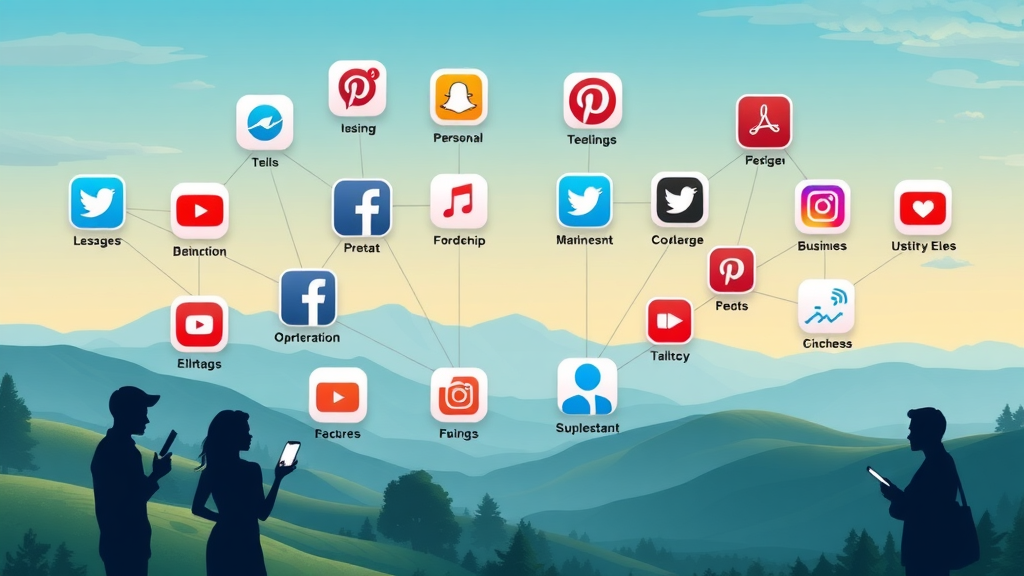Did you know over 90% of businesses credit social media platforms for business growth and customer engagement? Today, choosing the right media platform is more than a trend—it's a business necessity. Understanding where your brand fits among the social media giants and emerging platforms is the key to unlocking powerful marketing results and competitive edge for your business. In this guide, we’ll reveal facts, strategies, and industry secrets to help you navigate the ever-changing world of social media platforms for business success.

Why Social Media Platforms for Business Matter: Eye-Opening Facts and Figures
Did you know over 90% of businesses credit social media platforms for business growth and customer engagement? The numbers speak for themselves—social media platforms are the backbone of modern business marketing.
In today’s digital age, social media platforms for business aren’t just about posting updates—they’re essential for driving growth, boosting brand awareness , and engaging with audiences on a large scale. With over 4.8 billion active users worldwide, these platforms offer an unparalleled opportunity to connect with both existing and potential customers. Businesses leveraging media platforms report higher site traffic, improved lead generation, and increased sales.
Recent data shows that 73% of marketers say that their efforts through social media marketing have been “somewhat effective” or “very effective” for their business. What’s more, 54% of users say they use social media to research products, making your media presence pivotal in guiding purchasing decisions. Whether you’re running a small business or a large enterprise, understanding the power behind social media platforms can transform your media marketing approach—and your results.
Defining Social Media Platforms for Business: What Sets a Media Platform Apart

- What qualifies as a social media platform for business?
- Key features businesses should look for in media platforms
- The difference between personal and business-focused social media platforms
What makes a social media platform truly business-ready? Social media platforms for business typically offer specialized features such as analytics dashboards, advertising options, and branded business profiles that personal accounts lack. These platforms allow companies to track performance, target specific audiences, and engage meaningfully—all critical components of an effective media marketing strategy. For example, Facebook business profiles provide access to Marketplace, while Instagram business accounts unlock tools for insights and call-to-action buttons.
The main difference between personal and business accounts on any media platform lies in their intent and toolset. Business-focused platforms offer advanced media management, robust customer service features, and opportunities for collaboration or content planning not needed for personal use. By investing in the right business profile and utilizing these specialized features, companies create a more professional social media presence and maximize their potential for audience engagement.
Above all, selecting a platform aligned to your business goals and customer preferences ensures your social media strategy delivers maximum impact—whether you’re prioritizing video content, personal networking, or direct sales.
How to Build a Social Media Marketing Strategy for Small Business Success

- Set clear business goals for social media marketing
- Understand your target audience on social media platforms
- Choose the right social media platform for your business profile
- Develop a content calendar, including video content and post scheduling
- Leverage analytics to optimize performance
Creating a solid social media marketing strategy is vital for small business growth. Start by defining what you want to achieve—are you after increased site traffic, higher sales, or stronger brand awareness? Setting specific, measurable goals allows you to track your progress and adjust your strategy as needed. Once your destination is clear, investigate your target audience : Where do they spend their time online? What type of media content resonates most?
Choosing the right social media platform for business means understanding the user base and matching platform strengths to your goals. Not all platforms are created equal, so research is crucial. Next, develop a content calendar that balances media content variety, including images, video content (like Instagram Reels or YouTube tutorials), and interactive posts. Plan out when and what you’ll post, using scheduling tools to maintain a consistent media presence.
Finally, use analytics features provided by each platform to track what’s working—and what’s not. Refine your media marketing plan based on results, doubling down on content types and formats that attract the most engagement. This approach ensures your small business maximizes every opportunity across today’s competitive media networks.
The Top Social Media Platforms for Business: An In-Depth Comparison
| Platform | Key Features for Businesses | Target Audience | Advertising Options | Strengths for Media Marketing |
|---|---|---|---|---|
| Business profiles, Marketplace, targeted ads, analytics | Broad (all ages & interests) | Advanced targeting, multiple ad formats | Community building, content sharing, event promotion | |
| Reels, Stories, Shopping, comprehensive analytics | Younger, highly engaged users | Visual ad formats, influencer partnerships | Brand storytelling, product visuals, influencer marketing | |
| Company pages, networking, professional content | Professionals, B2B audience | Sponsor posts, InMail, job ads | Thought leadership, recruitment, industry outreach | |
| Real-time posts, trending topics, direct communication | News seekers, trend followers, brands | Promoted tweets, trends, hashtags | Immediate updates, customer service, viral engagement | |
| YouTube | Video marketing, SEO, subscriber building, analytics | Video audiences of all ages | Video ads, banners, sponsorships | Long-form & short video, tutorial content, high reach |
Facebook for Business: The Versatile Media Platform
- Massive user base and targeted advertising
- Facebook business profiles and marketplace
- Ideal for social media marketing and content sharing
With over 2.9 billion active users, Facebook remains the most used social media platform for businesses globally. Its advanced targeting tools and analytics allow brands to tailor their messages to specific audiences based on interests, demographics, or behaviors. The platform’s business profiles offer integrated features like Shop and Marketplace, letting businesses sell products directly and manage their media content in one place.
Facebook is a great platform for building community engagement, running effective ads, and driving site traffic to your website. From media marketing campaigns to organic posts and live events, it’s a hub for both B2C and B2B connections. Its adaptability makes it a strong foundation for any small business’ social media strategy.
Instagram: Visual Storytelling & Video Content in Social Media Marketing
- High engagement rates for brands
- Instagram Reels and Stories as video content channels
- Instagram business tools and analytics

Instagram excels in visual media marketing with its focus on imagery, short video, and stories. With more than 1.3 billion active users, the platform’s audience skews younger and more receptive to creative branding and influencer partnerships. High engagement rates make Instagram ideal for brands looking to build buzz with eye-catching media content and leverage influencer collaborations.
Business profiles unlock access to powerful analytics, shopping features, and in-depth promotional tools. The introduction of Instagram Reels and Stories provides new ways to connect with followers through dynamic, short-form video content. For small business owners who want to harness trend-driven campaigns, Instagram is a strong social media platform for both discovery and conversions.
LinkedIn: The Professional Network & Media Platform for B2B
- Professional networking for business profiles
- Industry-specific target audience
- LinkedIn content marketing strategies
LinkedIn stands out as the top professional network for B2B social media marketing . Its user base consists of decision-makers, job seekers, and industry thought leaders. For businesses looking to establish authority or recruit top talent, LinkedIn’s company pages and robust content features (such as LinkedIn Articles and SlideShare) are invaluable.
Targeted advertising on LinkedIn makes connecting with specific industries, roles, or geographic areas easier than ever, maximizing the returns on your media marketing efforts. By regularly posting company news, industry insights, or video content, you can grow your business profile, nurture relationships, and build a trusted media presence in your field.
Twitter: Real-Time Engagement on Social Media Platforms for Business
- Immediate connection with trends and followers
- Ideal for news, customer service, and media marketing
- Twitter business profiles and promoted content

Twitter is the leading social media platform for real-time communication. The platform’s strength lies in live engagement, breaking news, and viral conversations. With 450 million monthly active users, Twitter enables instant access to customers, influencers, and trending topics—making it an essential channel for public relations, customer service, and flash promotions.
Businesses use Twitter to monitor industry trends, respond to audience mentions, and promote special offers or media content directly to a highly active user base. Promoted tweets and hashtags allow you to reach new segments and measure the immediate impact of your social media marketing efforts.
YouTube: Harnessing Video Content for Business Marketing
- Largest video content platform for businesses
- SEO value for social media marketing strategies
- Brand storytelling and tutorials
YouTube is unmatched for long-form and short video marketing. As the world’s second-most popular website, its active users consume over a billion hours of video daily. Businesses of all sizes utilize YouTube for brand storytelling, product demos, and UGC campaigns, enjoying lasting SEO benefits from their video content.
“The brands that invest consistently in video content see a 49% faster growth in revenue compared to non-video users.” – HubSpot
YouTube’s advertising features are extensive, covering everything from skippable ads to product placements. For brands looking to build authority, reach new users, and boost social media presence, YouTube is a powerful addition to your overall media marketing strategy.
Emerging Social Media Platforms and Niche Media Marketing Opportunities
- Exploring new social media platforms for early adoption
- Clubhouse, TikTok, and Snapchat in social media marketing
- Small business case studies on innovative media platforms

While established giants dominate, forward-thinking businesses are betting big on emerging and niche media platforms . Platforms like TikTok, Clubhouse, and Snapchat have carved out significant spaces by offering unique media content formats (think short video or audio chats) and targeting younger audiences known for their trendsetting power.
Early adopters on TikTok enjoy viral growth through engaging short video content, while Clubhouse and Snapchat provide platforms for intimate, authentic connections. Small business case studies reveal that brands testing these channels often see outsized returns in engagement and brand awareness—sometimes simply because competition is still light.
For companies ready to experiment and adapt, establishing a presence on new social media platforms can be a game-changer for media marketing . Use these media networks for creative campaigns, audience research, or as pilot programs before scaling successful ideas to more traditional platforms.
Tailoring Your Social Media Platform Selection to Your Target Audience
Assessing the User Base of Each Social Media Platform
- Demographics and engagement statistics by media platform
- Matching your audience with the right social media platform for business
- Adapting your business profile for platform-specific branding

Every social media platform for business attracts a unique audience. Facebook boasts the largest and most diverse active user base, making it a staple for businesses with broad appeal. Instagram and TikTok cater heavily to Gen Z and Millennials, while LinkedIn shines among professionals in mid-to-senior roles. Analyzing user base demographics on each platform helps you pinpoint where your target audience is most engaged—and where your media presence will have the highest impact.
Customize your business profile on each platform to reflect your brand voice, visuals, and audience preferences. While LinkedIn demands polished, professional imagery and thought leadership, Instagram rewards creativity and aesthetic storytelling for brand awareness. Adapting content and branding to match platform expectations strengthens your overall media marketing results and boosts engagement.
Finally, regularly reviewing analytics and adjusting your business profile ensures you remain visible and relevant as audience behaviors change. Prioritizing platforms that align with your ideal customers is the cornerstone of a successful long-term social media strategy.
Business Profile Optimization Across Media Platforms
- Setting up an engaging and consistent business profile
- Best practices for imagery, bios, and links
- Leveraging platform-specific tools

Optimizing your business profile is the gateway to trust and recognition across social media networks. Start by using high-quality profile and cover images sized for each platform, ensuring they reflect your brand’s visual identity. Write clear, compelling bios that articulate what your business does and what sets you apart, and always include website and contact links for easy conversion.
Leverage each media platform’s unique tools—Instagram Highlights, LinkedIn Showcase Pages, Facebook Shop, or Twitter Lists—to further personalize your social media presence. Create platform-specific calls to action based on user behavior and media content type. A cohesive, intentional approach to media platform optimization signals professionalism and increases your odds of converting followers into customers.
Remember, the more complete and active your profiles, the greater your credibility. Review and update your business information regularly to keep pace with changes in your company, products, or target audience.
Social Media Platforms for Business: Video Content, Stories, and Live Streaming
- Comparing options for video content across social media platforms
- Success stories: Live sessions, stories, and interactive posts for business profiles

The explosion of video content has fundamentally changed how businesses connect with their audience. Platforms like YouTube are still the go-to for in-depth video content, tutorials, and vlogs, while Instagram and Facebook now offer robust features for short video clips, live streams, and stories. These formats make it easier than ever for businesses to share behind-the-scenes content, host Q&A sessions, or launch products in real-time. The immediacy and authenticity of video builds trust and increases engagement far more than static posts alone.
Success stories abound: small business owners report significant sales spikes and new customer acquisition after well-promoted Facebook Live events. Interactive features such as polls, comments, and real-time feedback transform viewers into participants, fostering a deeper sense of community. To maximize reach, experiment with a mix of live content, scheduled stories, and evergreen video across platforms, adapting to the preferred content formats of each user base.
Stay atop frequent shifts by monitoring how major networks are investing in media content and format innovations. Businesses willing to adopt new video trends early and integrate them into a broader social media marketing strategy often reap the greatest rewards.
Crafting a Winning Social Media Marketing Strategy with Analytics
- Tracking business profile performance on social media platforms
- Adjusting media marketing tactics based on analytics
- ROI measurement for social media platforms for business
Strong media marketing depends on data-driven decision making. Each major social media platform provides analytics dashboards to help track metrics such as impressions, engagement rates, click-throughs, and conversions. By reviewing what posts and campaigns perform best, you can refine your content calendar and allocate resources toward the highest ROI activities.
It’s not just about tracking likes or shares. Use analytics to segment performance by platform, target audience, time of day, and content type. If short videos are resonating on Instagram but not on Facebook, adjust your postings accordingly. Successful businesses make media marketing a cycle of hypothesis, testing, analysis, and optimization.
Most importantly, integrate outside data from your website, CRM, and e-commerce tools to get a full picture of your media strategy’s impact. Calculate your social media platforms for business ROI and adjust budget allocations to double down on tactics generating the most value. This continual improvement loop is your secret weapon for outperforming competitors and reaching your long-term business goals.
FAQs on Social Media Platforms for Business
- What is the best social media platform for business?
- What is the 5 5 5 rule on social media?
- What is the 50/30/20 rule for social media?
- What is the most used social media for businesses?
What is the best social media platform for business?
The “best” platform depends on your business goals and where your target audience spends time. Facebook offers unmatched reach and targeting for most industries, while Instagram excels in visual impact. LinkedIn is best for B2B and professional networking, and TikTok or YouTube are essential if video content is central to your media strategy. Assess your objectives and audience before choosing.
What is the 5 5 5 rule on social media?
The 5-5-5 rule refers to regularly engaging with 5 new people, appreciating 5 followers, and sharing 5 pieces of content daily. This approach helps businesses grow their network, stay proactive with their audience, and keep their business profiles consistently active, ultimately boosting their media presence and engagement levels.
What is the 50/30/20 rule for social media?
This rule suggests your social content should be 50% valuable and engaging, 30% shared from other relevant sources, and 20% brand-specific promotional content. Keeping this balance ensures you remain interesting to your followers while also meeting your business goals and avoiding audience fatigue from excessive self-promotion.
What is the most used social media for businesses?
Facebook is currently the most used social media platform for businesses, thanks to its diverse active user base, robust advertising options, and comprehensive analytics. Its broad reach makes it the default choice for businesses looking to maximize media marketing impact and connect with customers of all ages and interests.
Case Studies: Social Media Platforms for Business in Action
- Success stories in using different social media platforms
- Small business transformations via targeted social media marketing
- Lessons learned for future business profiles

Real-world case studies show just how powerful social media platforms for business can be. A local coffee shop increased foot traffic by 30% through regular Instagram Reels and community stories. A B2B consulting firm landed lucrative industry contracts after publishing thought leadership on LinkedIn and participating in professional network groups. Small e-commerce businesses frequently attribute surges in sales to well-timed Facebook Live demonstrations or Twitter giveaways.
The consistent thread in these success stories? Leveraging the right media platforms for their unique user bases, sharing compelling video content, and optimizing business profiles for maximum credibility. Through trial, error, and continuous analytics, these businesses transformed their media strategies and unlocked sustainable growth through social media marketing.
Common Pitfalls and Best Practices When Using Social Media Platforms for Business
- Top mistakes businesses make on social media platforms
- Best practices for developing a results-driven business profile
- Ethical considerations and compliance on media platforms

Even savvy businesses run into issues on social media. Top mistakes include overposting, neglecting customer feedback, inconsistent branding, and failing to adapt to evolving platform trends or algorithm changes. Ignoring analytics or spreading resources thin across too many networks can also dilute your impact and cause missed opportunities.
To avoid these pitfalls, commit to regular business profile audits, set clear content standards, and embrace ethical social media practices—like transparency, honesty in influencer collaborations, and respecting privacy regulations. Focus on building genuine relationships instead of chasing vanity metrics. Prioritize quality over quantity, and develop a media management process to monitor trends and respond to negative feedback quickly and professionally.
With these best practices, your small business will enjoy steady growth, stronger brand trust, and lasting influence across social media platforms for business.
Looking to the Future: Trends in Social Media, Media Platforms, and Marketing Strategy
- The shift towards short-form and interactive video content
- Rise of AI and automation in social media marketing
- Impact of evolving algorithms on business profile visibility
The next wave of social media platforms for business is shaping up to be highly video-driven and automated. Short-form video content (on TikTok, Instagram Reels, and YouTube Shorts) is surging in popularity, compelling brands to invest in bite-sized stories and authentic, real-time brand moments. AI tools for content scheduling, chatbots, and audience segmentation will streamline media management and enhance customer service capabilities.
Keeping pace with evolving platform algorithms will remain a critical challenge for businesses. Success will depend on the ability to quickly adapt content formats and posting strategies. As platforms prioritize meaningful interactions, those who focus on audience engagement, personalization, and interactive media content will greatly enhance their business profile visibility and overall media marketing results.
Key Insights to Remember About Social Media Platforms for Business
- Choosing the right social media platform amplifies reach and engagement
- Align business profiles with your audience’s behavior and platform strengths
- Ongoing analytics and adaptation fuel successful media marketing
Ready to Amplify Your Brand? Start Your Social Media Platforms for Business Journey
Video: Choosing the Best Social Media Platforms for Business
Explainer: How to select the most effective social media platform for your business type, audience, and goals. Feature engaging visuals and key decision frameworks.
Video: How to Optimize Your Business Profile on Media Platforms
Video: Top Social Media Marketing Trends for Small Businesses
Ready to make waves on Long Island? Let’s chart your course.
Take action: Evaluate your current media presence, select your ideal platform, create engaging video content, and consistently refine your strategy using analytics for maximum business growth.
Selecting the appropriate social media platform is crucial for maximizing your business’s marketing impact. To assist you in this endeavor, here are two authoritative resources that provide in-depth analyses and comparisons of various platforms:
- “The Best Social Media Platforms for Your Business” ( stellaractive.com )
This article offers a comprehensive overview of major social media platforms, detailing their key features, target audiences, and advertising options. It serves as a valuable guide to help businesses identify which platforms align best with their marketing objectives.
- “Which Social Media Platforms Should I Use for My Business?” ( online.wharton.upenn.edu )
Published by Wharton Online, this resource delves into the unique advantages of platforms like LinkedIn, emphasizing its effectiveness for B2B marketing and professional networking. It provides strategic insights to assist businesses in making informed decisions about their social media presence.
By exploring these resources, you can gain a clearer understanding of which social media platforms are most suitable for your business needs, enabling you to craft a more effective and targeted marketing strategy.
 Add Row
Add Row  Add
Add 




Write A Comment